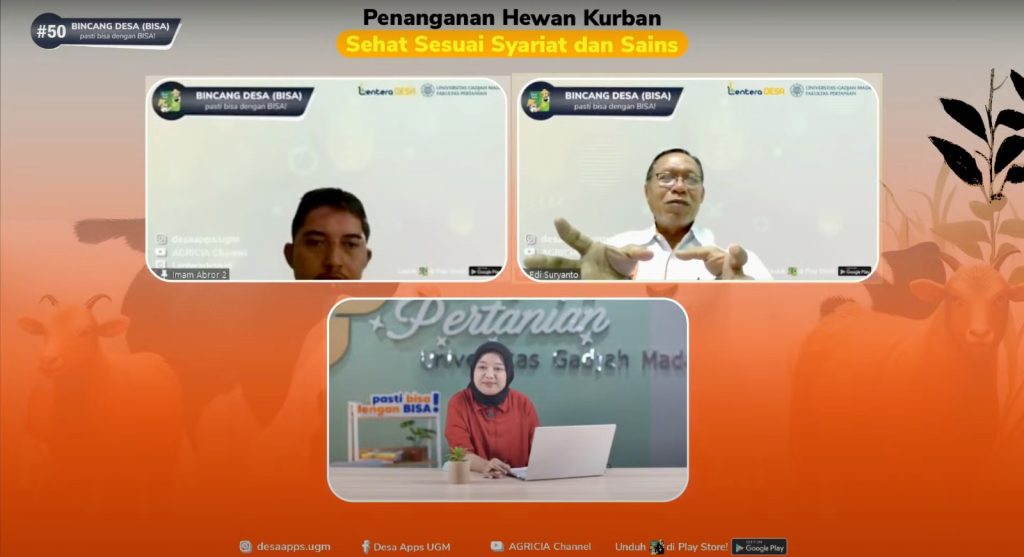
The Bincang Desa Webinar Series is an initiative by the Faculty of Agriculture, Universitas Gadjah Mada (Faperta UGM) in collaboration with the Desa Apps team of Faperta UGM as part of their community service efforts. This program focuses on interactive discussions between farmers, the general public, and experts in agriculture, fisheries, animal husbandry, and forestry. Each Bincang Desa session is designed to address community needs, as seen in the latest session, Bincang Desa #50.
Eid al-Adha is one of the most significant Islamic holidays, during which Muslims perform the ritual sacrifice (Qurbani) of livestock. To address the importance of proper Qurbani animal handling, the special 50th edition of Bincang Desa featured a discussion on the correct slaughtering methods according to Islamic law. The session hosted two distinguished speakers: Dr. Ir. Edi Suryanto, M.Sc., IPU., ASEAN Eng. (Faculty of Animal Science, UGM) and drh. Imam Abror (Founder of Lab Kampung Ternak Jogja).
The discussion began with an explanation of the Islamic guidelines for Qurbani slaughter. Dr. Edi Suryanto emphasized that slaughtering must be performed properly and in accordance with Islamic principles. He highlighted the importance of using a sharp knife to swiftly cut the animal’s throat, ensuring a humane and swift process. The technique should also be carried out in a clean environment to maintain meat quality and hygiene. Meanwhile, drh. Imam Abror explained that the animal should face the Qibla, and a specific prayer should be recited before the slaughter.
In addition to religious guidelines, the scientific aspects of Qurbani slaughter were also explored. Dr. Edi Suryanto demonstrated how modern technology can enhance efficiency and meat quality. For example, medical tools can be used to ensure the animal does not suffer during slaughter. This discussion highlighted the importance of integrating Islamic teachings with scientific advancements in Qurbani practices.
Qurbani slaughter is not just a religious ritual but a complex practice that requires a deep understanding of both Islamic laws and scientific principles. This discussion provided a comprehensive guide on how to conduct Qurbani properly and efficiently, with active participation from over 80 attendees.
Through this event, Faperta UGM reinforces its commitment to achieving several Sustainable Development Goals (SDGs), including SDG 1: No Poverty, SDG 2: Zero Hunger, SDG 3: Good Health and Well-being, SDG 4: Quality Education, SDG 15: Life on Land, and SDG 17: Partnership for the Goals.
Author: Rani Nur Rochim
Editor: Desi Utami
Photos: Agricia Channel
